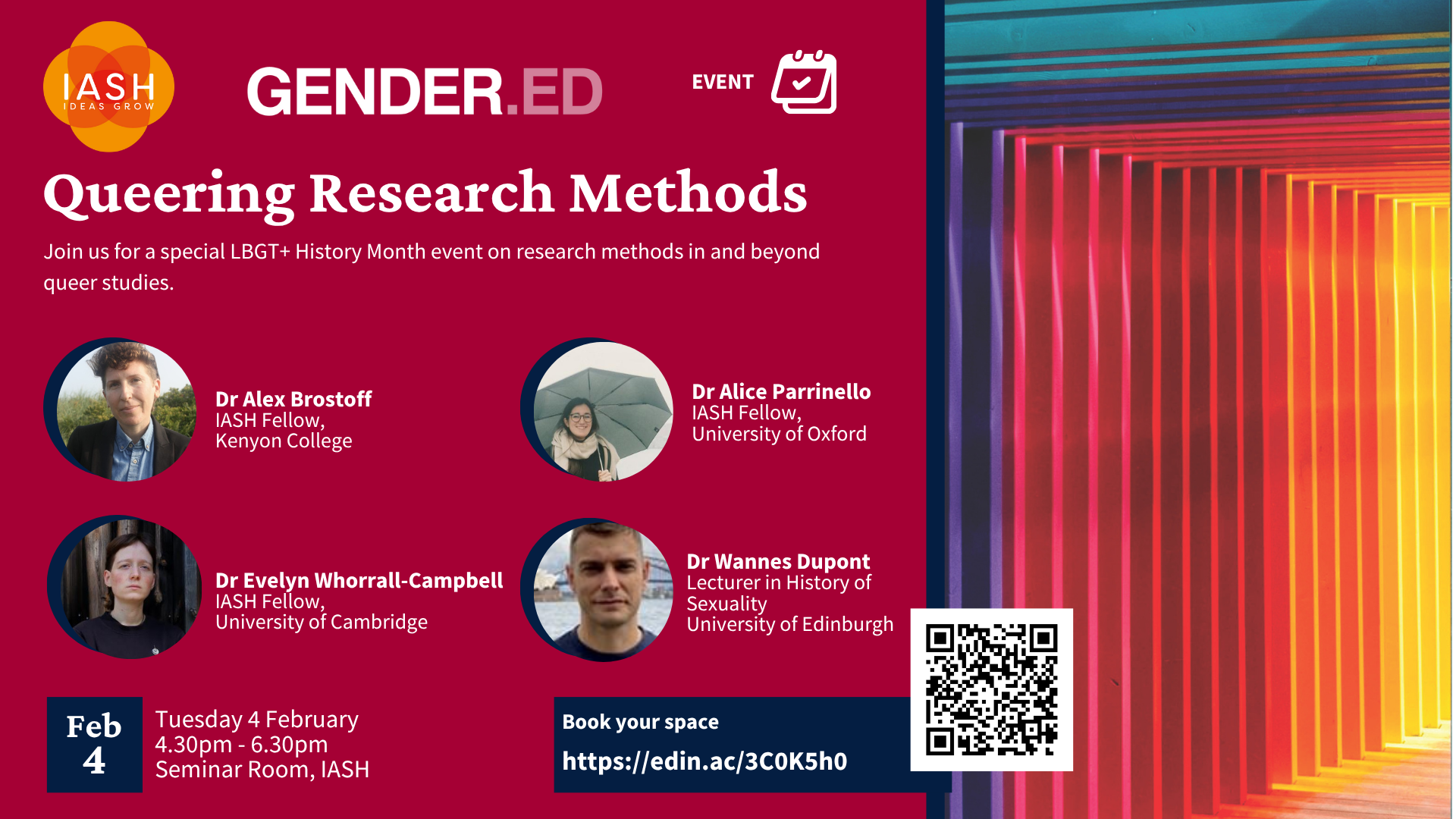Queering – research – methods: a conversation; an act of queer politics of citation
At the GENDER.ED/IASH event on queering research methods earlier this semester, panellists and IASH fellows Dr Alex Brostoff, Dr Alice Parrinello and Dr Evelyn Whorrall-Campbell sought repeatedly to go back to their pre-roundtable brainstorming meeting, as an act of queer politics of citation, offering us a collectively authored text not full of answers, but of further questions. In this blog, they do us the honour of talking us through their ‘pre-conversation conversation’ once more.

Alex, Alice, Evelyn: what does queering research methods mean to you in the context of your work?
Evelyn: This statement is informed by my own disciplinary background, but the first thing that comes to mind when thinking about queering research methods is a question about objects: what is the object of these methods: what is to be queered? And secondly, if we are ‘queering’ research methods, does that suggest that the research methods exist separate to the queerness you might bring to it? We need to problematise what queer means: queerness can be a politic, a community, an epistemology – i.e. it is a knowledge claim, a claim about what it means to know something. Understanding queerness as an epistemology can change what a method would even need to look like. It’s not as simple as doing the thing you were always dong, but in a ‘gay way’! Queerness as epistemology changes the very object of study. So you have to break that question down further.
Alex: We would propose literally breaking the phrasing down into its constituent parts: queering – research – methods. The underlying assumption here appears to be that an ostensibly normative research method calls for queering . All three of us think a lot about the early 1990s – a moment in which queer, then a pejorative slur, is reclaimed as a politic, as epistemology. If and when “queer” is read as a methodological modifier, how does that method impact an archive? We talked about directionality – what does it mean to apply a method to a cultural object or archive, and by contrast, what does it mean for a cultural object or archive to queer the method in question? In other words, how does a given archive produce or necessitate a methodology through which I might interface with it; and how are both the archive and the method transformed by virtue of their encounter?
Alice: We also discussed the theories we reference. In my case, I study Italian culture, so I want to localise my knowledge and not only look at Anglo-American sources. I want to look at this place and amplify and pluralize what we’re looking at. A queer methodology could inhere in the communal – being not just one way of looking, or talking, but having multiple things talk to each other.
Alex: To elaborate on Alice’s point about localisation– we were thinking comparatively about how the geopolitical contexts and cultures of our trainings have impacted our approaches to queering methods. In some contexts, the oxymoronic normalisation of queer theory—not to mention its co-optation by the neoliberal machine—begs the question: to what extent and under what conditions can “queer,” which bears a history of reclamatory politics, be reclaimed as a method?
Evelyn: Again, these dynamics are different in UK than the US. In my research, I examine ways in which the project of queer/trans studies in the 1990s was incomplete; I look at the ways these disciplines struggled to enter British higher education institutions in the 1990s. We should also grapple with the neoliberal impulse around queer studies other organisations like arts organisations – another site I research – where queerness has become assimilated into the machine of cultural production in a normative way, i.e. not a challenge to existing structures of distribution, power, etc. So, thinking about how to queer that; for me, I want to think about trans studies’ place – which can offer a practice of redistribution. This can be taking the resources of the institution outside the institution, but also more broadly, a materialist politics present in trans activism of the 1970s/1980s/1990s, which used a trans technique of knowledge sharing outside the institutions of medicine, psychiatry, etc. These techniques of knowledge sharing, redistributing knowledge through the internet for example, resist the neoliberalisation of certain kinds of knowledge production.
Alice: Going back to what I was saying about localising methods, the word queer is widely used in Italy but itis perceived as a fashionable English term, since it doesn’t connote the pejorative aspect that queer has in English-speaking contexts. Because of this, it is also widely contested. Activists and scholars are trying to propose alternatives that do have that pejorative element – going back to words used by activists of the 1980s/1990s to outvoice a neoliberal articulation of the word queer. This is why, for me, working with Italian texts is central – to avoid the threat of co-optation.
Biographies
Alex Brostoff is an IASH fellow and Assistant Professor of English at Kenyon College.
Alice Parrinello is an IASH fellow and was recently a Postdoctoral Researcher at Oxford University.
Evelyn Whorrall-Campbell is an IASH fellow and recently completed a PhD at Cambridge University.